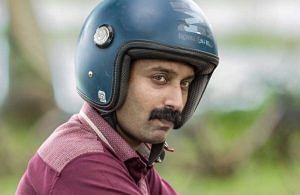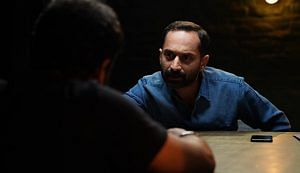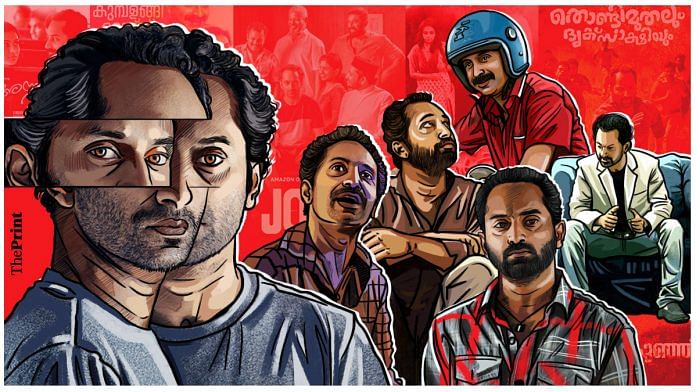For too long, the big question in Kerala film industry was — after Mammootty and Mohanlal, who? Over the years, several small answers came up. But never an answer that made the question go away. Now some are beginning to ask if the big answer is forming. With over 50 films in Malayalam, Telugu, and Tamil, Fahadh Faasil has shattered the hero stereotypes and invented his own definition of a ‘leading man’.
Even for the cinema lovers who woke up to the Malayalam cinema and other consequent films from southern India, Fahadh is a name synonymous with versatility.
In 2017, Irrfan Khan said that actors are not heroes. He emphasised that his endeavour had always been to convey to the audience that whatever he was doing [on screen], it was not special and anyone could be that person — even if it was an unlikeable human. In an alternate film industry, an actor had instilled a similar cinematic dogma.
“My father told me that if you are thinking of taking up acting, you should do it in a way that it is happening from your stomach, not from your brain.. it is about how you see things,” said Fahadh about the time he was contemplating a comeback after an eight-year break since his film debut in 2002. His father Fazil, a Malayalam film director, had launched Fahadh in Kaiyethum Doorath, which was a flop.

Fahadh has been vocal about an actor being brutally honest with reality and trusting his instinct. Perhaps, that has helped him orchestrate his way up to become the poster boy of new-age Malayalam cinema.
Also Read: ‘Why is your dad wearing a sari?’ South Indian films handle queer with care, unlike Bollywood
Star beyond the trope of ‘hero’
Vanity and image are often crucial markers for most Indian actors, regardless of the language industry. Most ‘heroes’ are seen playing the righteous man breaking bones or a pious man who can do no wrong. Leading men across film industries are rigged with this ‘Mr goody two shoes’ complex. Salman Khan, Shah Rukh Khan, Prabhas, Ram Charan, Mahesh Babu, and many more are big names in Indian cinema but how often have we seen them step out of the standard definition of a ‘hero’ and play a grey character? Well, to be fair, Shah Rukh Khan experimented with characters and took off with negative roles at the beginning of his career. But over time with success, he slipped into more formulaic roles as the king of romance. Now as he ages, he is experimenting away from the grid once again with Zero (2018) and Fan (2016).
In the same world exists an actor like Fahadh who is larger than the confines defined for the ‘hero’ of a film. Even as he is turning 40 this month, the actor has sprung into the echo chambers of people’s hearts across India — perhaps, a true-blue pan-India conquest. And mind you, he has not featured in even one Bollywood film so far. (Even among the big-budget masala entertainers, he had a guest appearance in Pushpa last year) Regardless, his films and performances are a hit among critics and at the box office.

Be it the blind artist in Artist (2013), for which he won the Kerala State Film Award, Shammi in Kumbalangi Nights (2019), or Cyril from 22 Female Kottayam (2012), Fahadh has essayed every role with finesse and authenticity. This is not to label the characters played by him as antagonists because most of them are not. Rather they are interspersed with shades of grey and complexity, much like human beings.
Also Read: Gayathri and Pushkar — Duo behind Suzhal-The Vortex, the Indian thriller going global
Fahadh and his multiverse
Fahadh Faasil’s characters over his 13-year career (if we discount his unsuccessful debut in 2002, and consider his filmography from 2009) are far from perfect. His lead roles are either too funny or peppered with shades of grey or self-centric — characteristics not traditionally borne by ‘heroes’. In Kumbalangi Nights, Fahadh’s character Shammi looks into the mirror and describes himself as “the complete man”. He is unpredictable, obsessed with what he believes in, and is often, borderline creepy. In theory, he is not a man one would visualise as a ‘hero’.
In the 2013 film Artist, Fahadh transforms into an egoistic blind painter who abides by the motto of ‘I, Me, and Myself’ in his life. In most films with a leading man, the often-used narrative trope is that the ‘bad boy’ metamorphoses into an ‘ideal man’ by the end of the film. Here, we see no such change happening. He remains unsympathetic throughout.

Besides his impeccable acting prowess, Fahadh’s eyes could have a separate fanbase. In most of his films, what he does and how he uses his eyes to emote elevates the script to a different level. In Annayum Rasoolum (2013), Rasool does not speak to Anna until the end of the first hour of the film. His language of romance and conversing is mostly through his eyes.
In one scene in Bangalore Days (2014), as Shiva’s wife gets pictures clicked with her brothers, he simply refuses to make eye contact with her to express his disapproval. Much like this scene, one does not need subtitles to understand the tone of the scene Fahadh acts in.
In April 2020, Indian cinema woke up to the news of actor Irrfan Khan’s demise. Among the thousands of tributes was a letter penned by Fahadh Faasil. He said that he owed his career to the late actor. “There are actors who are intense, who are stylish, and who are charming… this was the first time I ever saw an actor who was original on screen,” wrote Fahadh, describing Khan’s performance in Yun Hota Toh Kya Hota. Though the Eklavya never met his Dronacharya, Fahadh imbibed Irrfan’s spirit in his versatile performances. Perhaps, he is filling Irrfan’s shoes, not Mammootty’s.
Views are personal.
This article is part of a series called Beyond the Reel. You can read all the articles here.
(Edited by Neera Majumdar)



